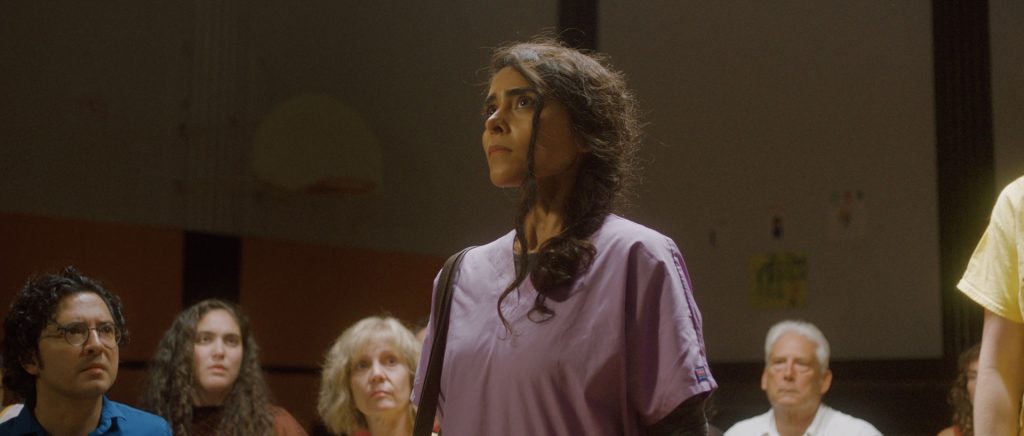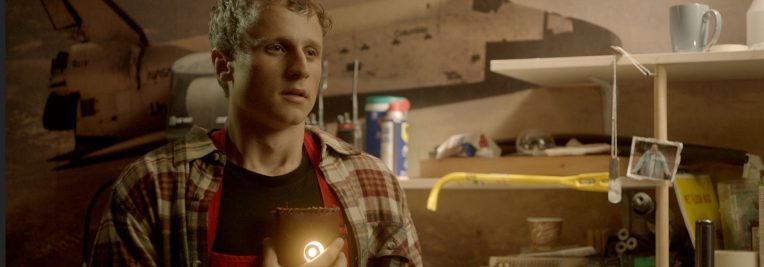In a recent post on the eighth annual Philip K Dick Film Festival, we announced a wide range of filmmakers and projects that will be shown at the festival. Many of these are premiering in public for the first time, which is the case for American Quartet from Filmelodic. I was fortunate enough to receive an early screener of the film and am pleased to say that it speaks highly of the continued increase in quality and platform that the PKD Film Festival is becoming well known for.
An excellent short piece that effortlessly mixes the techniques of early silent cinema with a moving orchestral soundtrack, American Quartet presents us with a futurist view of how technology will impact middle America. Although everything on the surface seems familiar and quaint in this small town in 2037, underneath a whole different level of engagement is being unlocked by technology that allows people to recall and share emotional memories.
Directed by the internationally acclaimed Head of Directing at San Diego State University, Jesca Prudencio, the film asks the question: Will it take a technological breakthrough for Americans to learn empathy? The vibrant classical soundtrack uses ‘American Quartet’ composed by Antonin Dvorak that informs the title of the film and uplifts the artistic flair of award-winning cinematographer Nona Catusanu to speak directly to the divided, ideologically-driven realities of modern America. This is a film of hope that innovation in empathy-based technology might help us see through one another’s eyes and open up new avenues for understanding the shared human condition.
Coming in at just under 9min, the film is shot beautifully with a top-tier cast and the accompanying orchestral score is a perfect foundation to express important social topics of today. As a short film expressed without dialogue, it conveys a lot of concepts with little exposition; but the nature of the story and its core message of human empathy among social division resonates and is immediately recognisable to all of us.
Director Jesca Prudencio sums up the concept of the film by explaining that:
“Diaries, by definition, are deeply personal objects, and in American Quartet, we have created a world where these objects hold… our true experiences, memories, and feelings. They cannot be articulated into words, so you will see how the characters record and relive them in a personal and magical way. In our world, no words can articulate empathy. It can only be experienced, and the diaries are the portal for that.”

Although beginning from a position of social division, this is ultimately a film about overcoming deep-seated emotional challenges. Yekta Khaghani, who plays the lead role of Noreen (in her IMDB debut), highlights this by saying that “unlike most films that have a dystopian prevision about the future and the use of technology, this film leaves us hopeful.” She continues, on the film’s throwback to silent cinema, to add that she “always wanted to act in a silent film or capture a character who doesn’t necessarily rely on speaking and dialogue, rather delivers and expresses emotions by eyes and gestures. This enthusiasm goes back to my background, the poetic cinema that I grew up with.”
The film’s exaggerated hyper-reality, with impactful, punchy music and expressive silent-film-style acting, combines to bring about a refreshing mix of cinematic art with the story of how new technology will impact our age-old ways of being. Filmelodic and everyone involved have done an excellent job and their experimental filmmaking needs to be applauded and supported so that we can see more art of this kind produced.
Festivals such as the Philip K Dick Film Festival are important avenues for these projects to get the attention they deserve, which is why Future Conscience has long been a proud supporter of the festival as it goes from strength to strength (see our two interviews with festival founder, Daniel Abella, from 2016 and 2017).
The futurist community needs to embrace art and creativity alongside the wide range of innovation, trend projections and business analysis that the sector is best known for. Films such as American Quartet are out there and ready to inspire us, speaking to the core of the human condition today and showing us that we can have hope in the future even though it might seem so uncertain in this day and age.
I was particularly grateful to view a screener copy of this short film as I’m not based in the US and won’t be able to make the festival itself. For those who can take part, make sure you book tickets to see American Quartet on Thursday 5th March at the Philip K Dick Film Festival at the Museum of the Moving Image in Astoria, NY.





